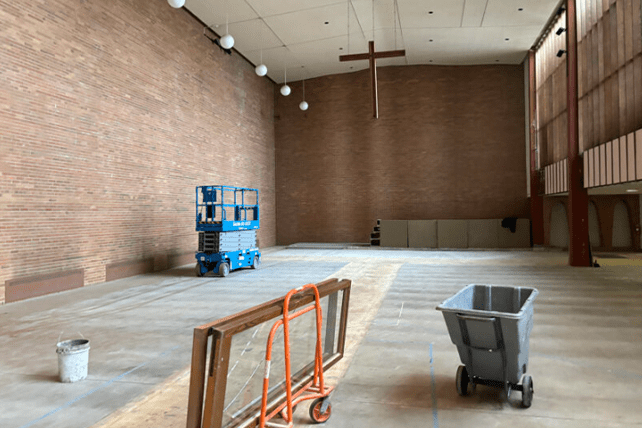A struggling Lutheran church has found new life by giving its building to the YMCA
By Bob Smietana
ROCKFORD, Ill (RNS) — In early April, just a few days after Easter, Good Shepherd Lutheran Church was filled with sounds of new life.
And hammers.
Two years ago, the church, which has shrunk from a congregation of 400 to a few dozen worshippers, decided to donate its building to the YMCA of the Rock River Valley in hopes the building could be reborn as a local Y. After months of planning and fundraising — the project will cost about $3 million — the rebirth of Good Shepherd finally got underway in late March 2024.
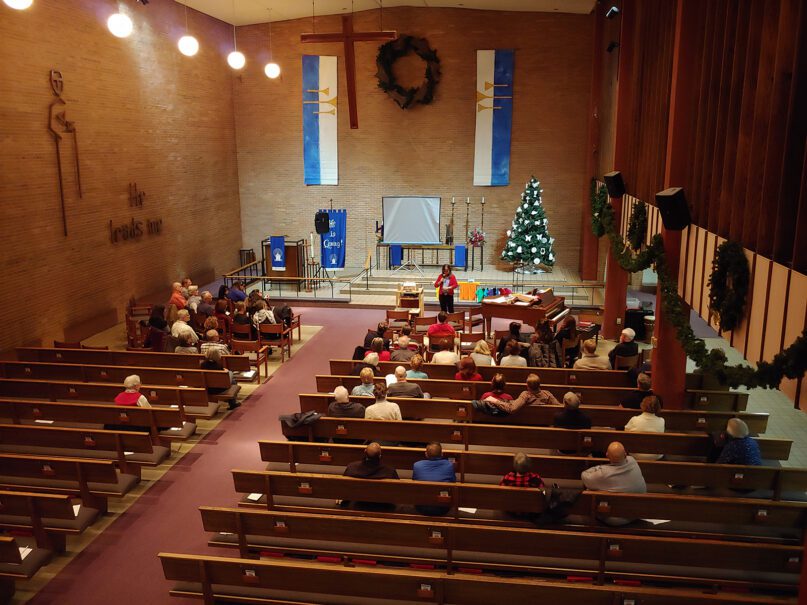
On Tuesday, April 2, the Rev. Eric Lemonholm, pastor of Good Shepherd, and Brent Pentenburg, CEO of the YMCA of the Rock River Valley, took a tour of the 1950s-era church, which is being transformed into Good Shepherd YMCA. There were smiles all around as a long-anticipated dream was becoming a reality.
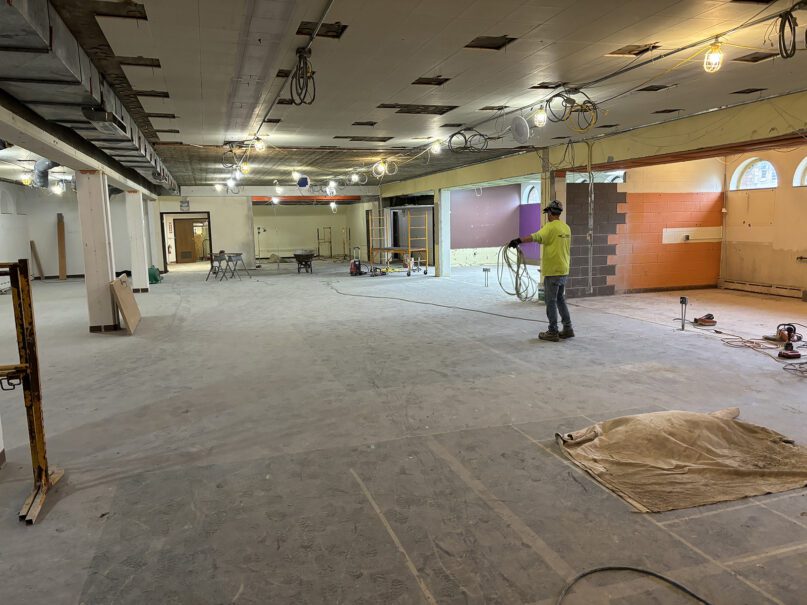
“We were once a big congregation in a big building,” said Lemonholm. “Then we became a small congregation in a big building for decades. The congregation knew something had to change.”
In recent years, the people of Good Shepherd, like thousands of congregations nationwide, found themselves dealing with the new math of American religion. In 2000, the median-sized congregation in the United States had 137 people, while today that number stands at about 60, according to data from the Faith Communities Today study. That has left congregations like Good Shepherd with buildings they can’t fill or afford to keep up.
Rather than closing its doors, the congregation at Good Shepherd decided to find a partner to share their space and continue the congregation’s work in the community. When the renovations are complete, the church’s former classrooms will house a fitness center and changing rooms, and the boxy sanctuary will be a brand-new gym. The congregation will continue to hold services in a small chapel at the new YMCA facility when it opens. In doing so, they’ll become part of a small but growing group of churches who decided to make the Y their permanent home.
“We’ll be the church in the Y,” said Lemonholm, who splits his time between Good Shepherd and another small Lutheran church.
Founded in 1844 as the Young Men’s Christian Association, the YMCA’s official mission is “to put Christian principles into practice through programs that build healthy spirit, mind and body for all,” but the group has no official ties to any church or denomination, instead partnering with people from all backgrounds. In some communities, the Christian part of the mission is stressed more than in other communities.
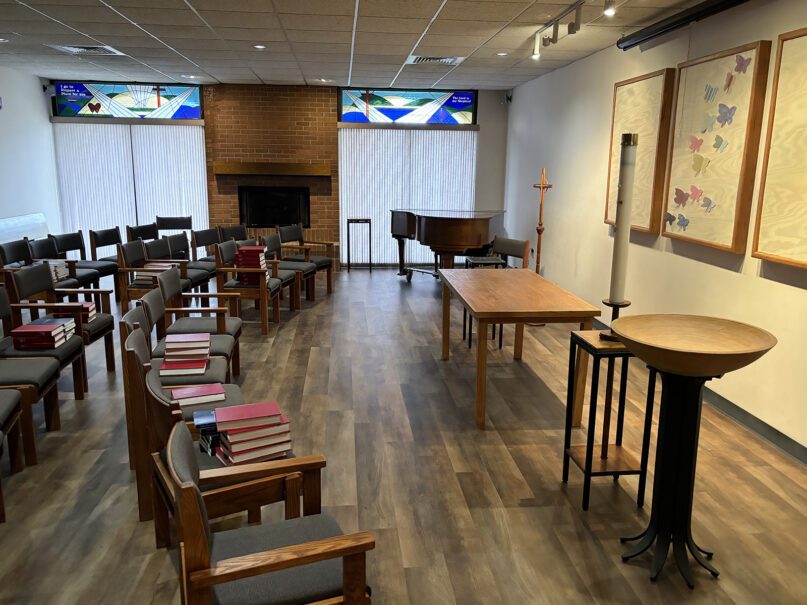
The YMCA’s history and mission often make it a popular spot for startup congregations to meet before they can afford a building of their own. According to Tim Hallman, a former pastor and director of Christian emphasis for the YMCA of Greater Fort Wayne, Indiana, several churches like that rent space from the Y in their community.
“They’ll do their church plant at the Y for a couple of years,” said Hallman, “and everyone knows the plan is that they move out.”
But some decide they love the Y so much they end up staying long-term.
That’s the case for St. Joe’s United Methodist Church in Fort Wayne, which launched a new campus at Jackson R. Lehman Family YMCA when it opened in 2018. Ashley Moreland, pastor of St. Joe’s at the Y, says that — in a time when people don’t go to church — bringing the church to where people are already gathering makes sense. St. Joe’s holds services on Sunday mornings and has a “ministry of presence” that provides prayer chaplains for Y members, said Moreland. The church also cohosts events during the year with the Y, providing volunteer support, and opens some nearby athletic fields it owns (known as Praise Park) to the Y for its summer camp programs.
She said folks who come to the Y already want to make changes in their lives — to lose weight or feel healthier — so they may be open to improving their spiritual health, said Moreland. Plus, the church can also offer a friendly and supportive presence.
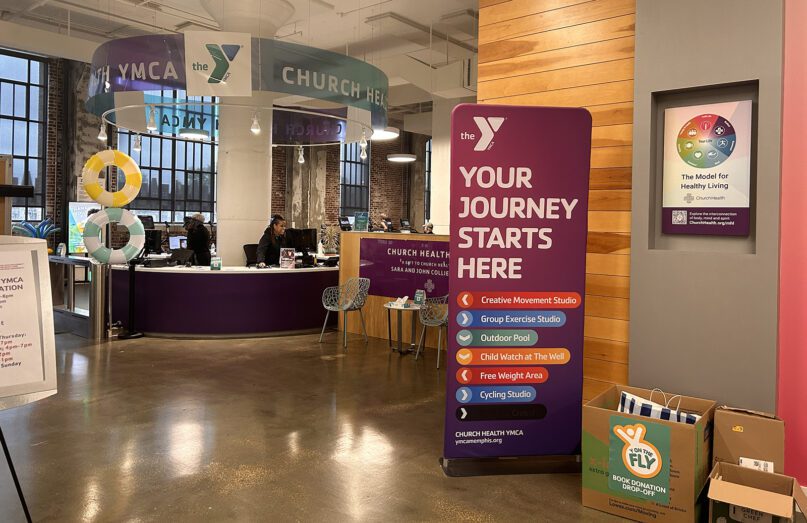
“It allows us to meet people where they are and show them that there’s a God who loves them and there are people who love them,” she said.
Mike Newman agrees.
Newman, who pastors a church that makes its home at the Countryside YMCA in Maineville, Ohio, just outside of Cincinnati, said that folks sometimes wander into his office looking for spiritual counsel or conversation.
“What pastor gets the community knocking on their door asking for help?” he said. “Usually, we’re the ones pursuing and going out to meet people.”
Newman is a leader in the CITY Movement, which hopes to start more long-term partnerships between churches and the YMCA. The group, whose name stands for “Church in the Y,” hopes to get pastors to stop seeing the Y as a short-term option for a meeting space and to see the Y as a long-term partner.
Sometimes, a religious group will make space for the Y in their own building. That was the case in Memphis, when Church Health, a major nonprofit that provides care to the uninsured, moved into a new building in 2017 and offered part of its space to the YMCA.
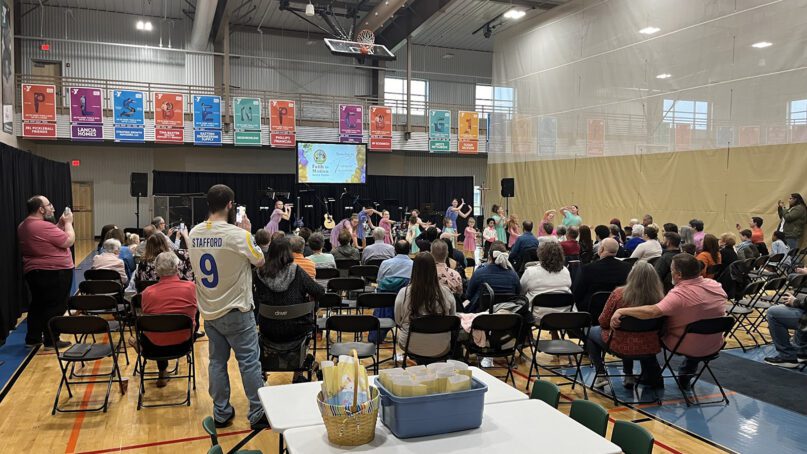
“It means I no longer have to fix treadmills,” said Scott Morris, founder and president of Church Health, with a smile in his voice.

Church Health, he said, runs a physical therapy program and used to have equipment of its own. Now it shares equipment with the Y. Both Church Health and the Y, Morris said, are interested in the health of the people they serve — both in body and soul.
“Being healthy is not about the absence of disease,” said Morris. “It’s ultimately about having more joy in your life, having more love in your life and being driven closer to things greater than we are, which we would call God.”
Partnering with a Y is not for everyone, said Tim Hallman, director of Christian Emphasis for the YMCA of Greater Fort Wayne. It requires trust and a close relationship between the congregation and the Y staff. When he talks to churches that want to partner with a Y long term, Hallman has one simple question: “Do you love the Y?” He asks a similar question to Y leaders thinking of partnering with a church. If each group isn’t committed to the other’s success, sharing space won’t work.
The partnership at the Good Shepherd YMCA in Rockford was years in the making, said Kamrin Muhammad, the Y’s executive director of college and career readiness.
“We definitely started dating before we got married,” she said.

The church had known for some time they’d need to come up with a plan for the future. Officials started by sharing space with other groups, including Lutheran Social Services, a Pentecostal congregation and even a model train association.
Eventually, they approached leaders at the Y. The Y was interested in the project, in part because Good Shepherd is right across the street from a middle school and is located in an underserved community. The Y wanted to start an after-school program in the area and began using Good Shepherd’s building in 2020 in hopes that a long-term partnership would develop.
Lemonholm said the partnership has been a godsend for the congregation.
“We have stability and longevity now,” he said. “It has allowed the congregation to start thinking about the future, thinking about our neighbors, thinking about what we can do to share God’s love. I wouldn’t go back.”
First published April 19, 2024


